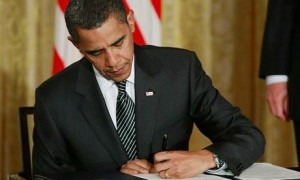President Obama has a chance to craft a second-term legacy on climate change even as the rest of his agenda runs aground in Congress.
Gun control legislation is dead; immigration reform is on life support; and reaching a fiscal deal with Republicans appears to be a long shot.
To make matters worse, what was supposed to be his signature first-term achievement — ObamaCare — is suffering from a disastrous rollout.
But there’s one thing that’s going right for Obama: Executive action on climate change is moving full-speed ahead at the Environmental Protection Agency (EPA).
“He may be able to do more through climate change [rules] because the EPA has the authority,” Sen. Richard Blumenthal (D-Conn.) told The Hill on Thursday.
The most far-reaching piece of Obama’s climate plan is carbon emission standards for the nation’s fleet of existing power plants, by far the largest single source of industrial carbon emissions. The EPA is also writing standards for new plants.
“I think climate change, immigration reform are both sort of legacy issues,” Blumenthal said. “The measure of his presidency will be whether he has left changes in law and regulation, but also a heightened awareness, which I think he has been doing.”
Princeton University professor Julian Zelizer said the push on climate change through executive action could shape Obama’s legacy — but only to a point.
“There are limits to what it will mean to his presidency,” said Zelizer, who teaches history and public affairs.
One problem facing Obama is that some of the new EPA regulations might not be settled by the time he leaves office.
“[Administrative actions] don’t have the same kind of impact in defining a president as big legislative accomplishments and they are more susceptible to being overturned,” Zelizer said. “The next president can change them. That’s always the problem.”
The president in June told the EPA to release draft federal emissions rules for existing power plants in June 2014 and complete them a year later. Then states would have until mid-2016 to submit plans to the EPA to implement the mandate.
But the coal and power companies are certain to challenge the rules in the courts.
“Even if EPA is able to stay on schedule and sign the final … rule by June of 2015, it is very unlikely that litigation over the rule will be resolved before the President leaves office,” said Jeff Holmstead, a partner at Bracewell & Giuliani who was the top air pollution regulator at the EPA under President George W. Bush.
Holmstead noted that after states submit their plans, the EPA must decide whether to approve or disapprove them.
“At that point, there is likely to be litigation over EPA’s decision,” said Holmstead, whose firm represents power companies that use coal and refiners that oppose EPA regulation, among other clients.
Holmstead predicted there would be “years of litigation” on the existing power plants rules, involving “possibly as many as 50 different lawsuits in every U.S. Circuit Court in the country.”
The White House is seeking to bolster public support to ensure the climate change actions stand the test of time.
Administration officials are seeking to parry intense criticism from Capitol Hill, where EPA critics are going on the offensive against the power plant rules.
EPA Administrator Gina McCarthy and Energy Secretary Ernest Moniz have been making a series of speeches and media appearances in support of Obama’s agenda.
Green groups are also marshaling their forces behind the rules.
Jeff Nesbit of Climate Nexus, a group that promotes action on climate change, said it’s important to have members of Obama’s green team promote the effort, even if the White House doesn’t need congressional approval.
Nesbit, the group’s executive director, said the “artificially contrived climate science debate is ending,” but added that’s just one step for advocates.
“McCarthy and Moniz are powerful, articulate defenders of both the science and necessary actions that emerge from that science basis — which is precisely what we need to reach a critical mass where a significant majority of the public wants and accepts actions to deal with climate change,” Nesbit said.
Polling suggests climate advocates still have work to do with the public.
Pew Research Center polling conducted in mid-October showed that 67 percent of adult U.S. residents say there’s solid evidence of global warming, a figure that Pew notes has “changed little in the past few years.”
Just 44 percent say it’s mostly caused by human activity. That’s in sharp contrast to the scientific consensus that the earth is warming and that burning oil and coal and other human actions are the major driver of it.
It’s also unclear how vigorously Obama will promote his climate policies.
The president devoted portions of his inaugural address and State of the Union speech to climate, and he then delivered a major speech spelling out his second-term plan.
But White House aides did not say Friday morning whether more speeches were in the works.
. . . . . . . . . . . . . . . . . . . .
Ben German is a reporter at The Hill who focuses on energy issues.
